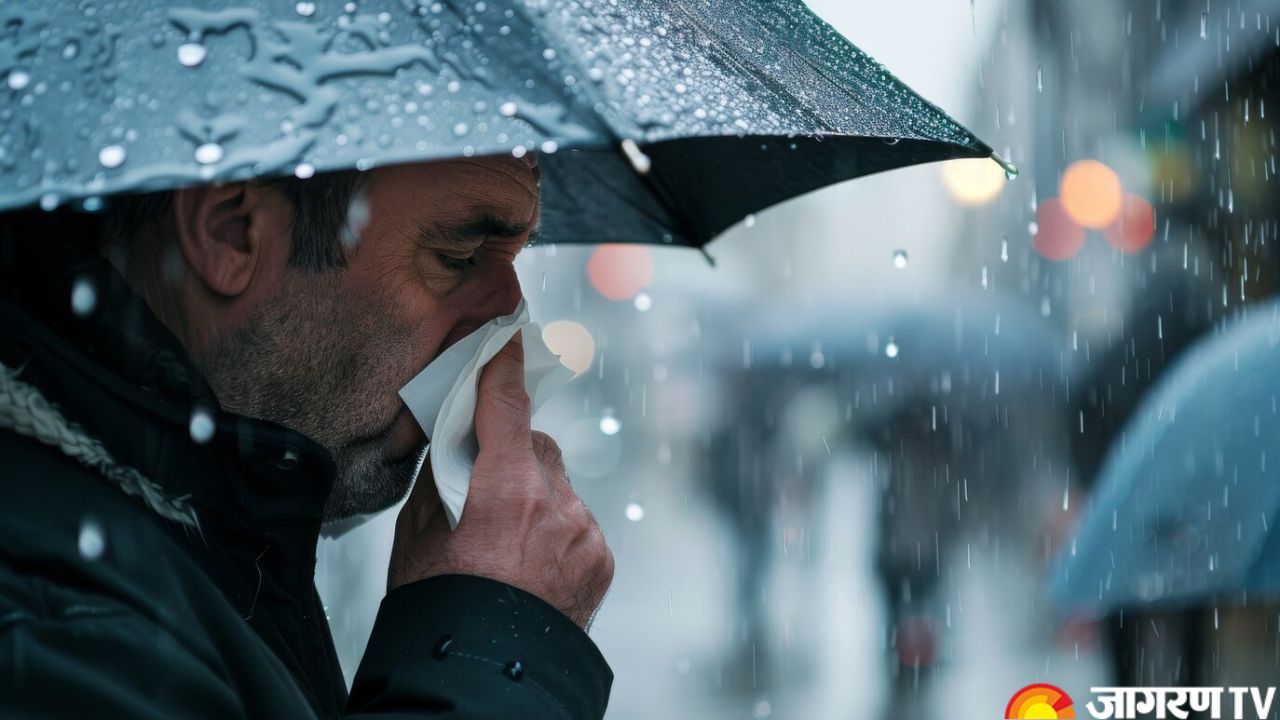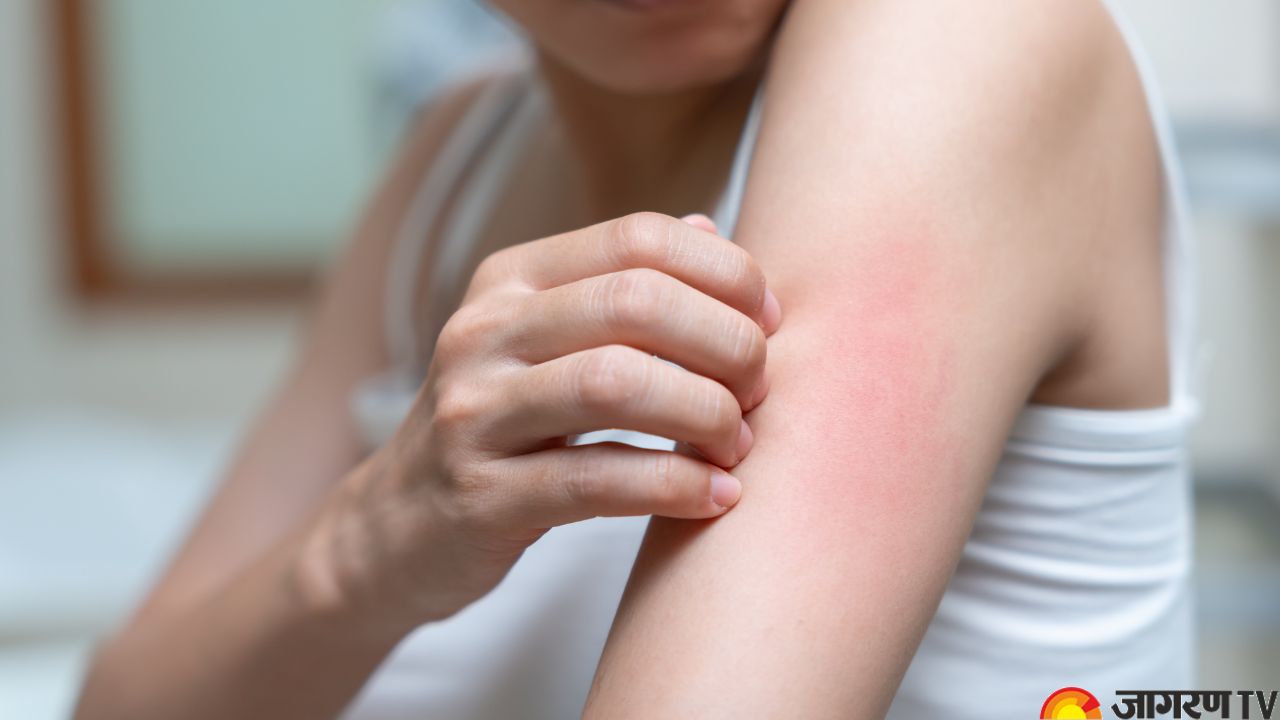Monsoon Health Tips: Common Allergies That Occur During Rainy Season, Causes, Home Remedies, and More

Monsoon Health Tips: The season of fresh drops and chilly wind has started, giving a cooling sensation and much-needed relief from the hot weather. However, monsoon also brings various health challenges, including allergies. The increased humidity, wetness, and stagnant water provide a great breeding ground for many allergens, resulting in a surge in allergy reactions.
Let us delve into the common allergies that occur during the monsoon season, their symptoms and cure.
Causes of Allergy in Monsoon
-
High humidity levels promote the rapid growth of mould and mildew both indoors and outside. These fungi emit microscopic spores into the air, which, if inhaled, can cause respiratory and skin allergies. They’re commonly seen on moist walls, ceilings, carpets, and even forgotten rubbish.
-
Dust mites flourish in humid conditions. They are widely used in bedding, upholstery, and curtains. Their droppings, which become airborne, are strong allergens, causing a variety of unpleasant symptoms.
-
While spring is mainly associated with pollen, some weeds and grasses continue to pollinate during the rainy season. Heavy rains may wash some away, but strong winds can swiftly generate fresh bunches, keeping pollen levels high.
-
During the monsoon season, the heavier, more humid air traps environmental contaminants and irritants closer to the ground, amplifying their influence on delicate respiratory systems.
-
Damp clothing and shoes can harbour fungus and bacteria, causing skin irritations and illnesses.
Common Monsoon Allergies
Allergic Rhinitis (Hay Fever)
This is the most common monsoon allergy, identified by inflammation of the nasal passages. It is primarily caused by mould spores, pollen, and dust mites. Common symptoms include frequent sneezing, a runny or blocked nose (with thin, watery discharge), itchy eyes, a scratchy throat, and post-nasal drip.
Asthma
Individuals with pre-existing asthma may find the monsoon especially tough. Mould, dust mites, and wet, colder air are important asthma triggers during the monsoon. Increased air pollution during this period can exacerbate symptoms. Symptoms include wheezing, chronic coughing (particularly at night), chest tightness, and shortness of breath.
Conjunctivitis (Pink Eye)
Conjunctivitis is an inflammation of the conjunctiva that is typically caused by allergic responses or infections. Symptoms include red, itchy, and watery eyes, which may be accompanied by bulging eyelids. Conjunctivitis may be caused by pollen, dust, or bacterial infections, all of which are more common during the rainy season.
Skin Allergies
Dampness and excessive sweat can aggravate or cause new skin disorders. High humidity, exposure to mould, irritants such as moist garments or cheap synthetic materials like raincoats, and excessive sweating that does not dry quickly all contribute to salt irritation and rapid fungal growth. Symptoms include rashes, hives, dry or scaly skin, eczema flare-ups, ringworms, and a white, hairy growth between fingers and toes (athlete’s foot). Bacterial infections such as folliculitis and impetigo are also prevalent.
How to Cure Monsoon Allergy?
-
Clean your surroundings on a regular basis, paying special attention to moist areas. Use a vacuum with a HEPA filter.
-
Use dehumidifiers to regulate indoor humidity levels between 30% and 50% to prevent mould and dust mite growth. When it's dry and sunny, open the windows and use exhaust fans to ensure proper ventilation.
-
Repair all leaks immediately. Clean surfaces using a solution of water and vinegar.
-
Shower regularly, especially after entering indoors, to remove pollen and mould spores. Change out of wet garments right away. Wash your hands frequently.
-
Choose hypoallergenic pillows, mattress covers, and bedding. Wash your bedding in hot water to kill dust mites.
-
Stay inside on dry, breezy days. Avoid gardening tasks that trigger allergy. When exposed to high pollen or mould levels, wear a face mask.
-
Avoid eating unwashed veggies and street food. Drink purified, boiled, or filtered water. Some advocate avoiding meat and fish during the monsoon season since they are breeding and may contain viruses.
-
For information on recommended medicines, consult a healthcare practitioner.
Home Remedies for Relief
While not a replacement for medicines, a variety of home remedies can give some relief.
Nasal Irrigation (Neti Pot)
Rinsing the nasal passages with salt water helps to remove mucus and allergies. Use boiled (and then cooled) or distilled water.
Steam Inhalation
Inhaling steam might help cleanse the nasal passages and relieve congestion.
Aloe Vera
Fresh aloe vera gel contains soothing and cooling characteristics that might help with skin allergies.
Baking Soda
Due to its anti-inflammatory characteristics, baking soda mixed with water can help calm irritated skin. An oatmeal or baking soda bath can also help.
Coconut Oil
Massage coconut oil into itchy skin to moisturise and reduce irritation.
Neem
Neem powder, mixed with water and applied to affected areas, has antifungal and antibacterial properties that can soothe skin.
Cold Compress
Use a cold compress or ice pack to soothe itchy or inflamed skin.
Hydration
Drinking plenty of water helps keep the skin hydrated and can thin mucus secretions.
Anti-Inflammatory Foods
Incorporate foods rich in omega-3 fatty acids (fish, flaxseeds) and vitamins C and E (oranges, spinach) to boost immunity. Spices like turmeric and ginger also have anti-inflammatory properties.
Foods to Avoid
Limit dairy, processed foods, and sugary snacks, which can worsen asthma symptoms by increasing mucus.
Clothing
Wear loose-fitting, breathable clothing made from natural fibres like cotton to keep the skin dry.
Related Videos
-
17 Jul, 2025
Parliament Monsoon Session: Modi Govt. Likely To Push 8 Bills ...
-
17 Jul, 2025
Weather Update: IMD Issues Alert For Heavy Rain In Delhi, Uttar Pradesh, Bihar And Other ...
-
16 Jul, 2025
Monsoon Skincare For Swimmers: Effective Regime To Keep Your Skin Hydrated And Glowing ...
-
15 Jul, 2025
Monsoon Health Tips: Skin Allergies During Rainy Season, Causes, Symptoms, Treatment, and More ...
यह भी पढ़ें
-
09 Apr, 2023
IPL 2023 : आज हैदराबाद और पंजाब में कौन मारेगा बाजी, ऐसी हो सकती है दोनों टीम की प्लेइंग इलेवन
-
09 Apr, 2023
कोरियन दूल्हे ने इंडियन स्टाइल में की शादी, घोड़ी भी चढ़ा और भांगड़ा भी किया, वीडियो हुआ वायरल
-
09 Apr, 2023
-
09 Apr, 2023
आकांक्षा दुबे मामले में आरोपी समर सिंह को भीड़ ने दौड़ाया, 14 दिन की न्यायिक हिरासत








